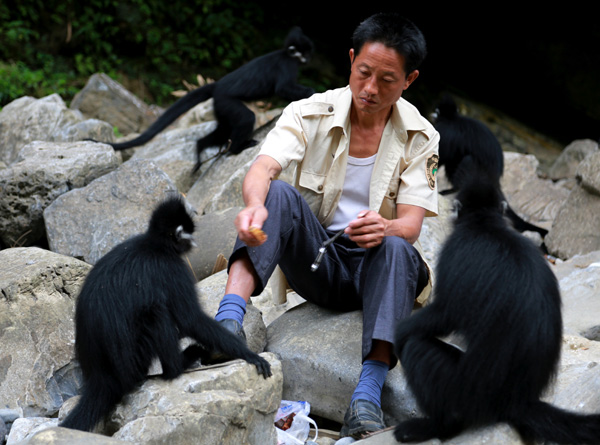

Xiao Zhijin feeds Francois' langurs in a nature reserve in Guiyang, Guizhou province, in September. YANG JUN/CHINA DAILY
Xiao Zhijin's routine has been unchanged for decades. At 8 am he treks several kilometers to a river valley, bringing breakfast to his friends of 26 years. No words are spoken, but the communication is excellent.
Those waiting for breakfast are Francois' langurs, one of the world's rarest monkeys. Named after Auguste Francois (1857-1935), a French diplomat based in southern China, the monkeys have a distinctive look with black, silky hair and distinctive white sideburns that grow from their ears to the cheeks.
Xiao, 52, first came into contact with the monkeys as a forest ranger in 1987, but it was another 10 years before he actually took charge of monitoring and taming them at the Mayanghe Nature Reserve in the Yanhe Tujia autonomous prefecture of Guizhou province.
On arrival at the spot on the Mayanghe River, Xiao gave a three-whistle signal, and 10 langurs rushed to meet him as he handed out potato chips.
"There should be 11," Xiao said, unable to hide his concern. "Maybe the missing one is dead."
While Xiao has a special relationship with the langurs, nearby villagers once had a different outlook and regarded them as pests.
"No one could get close to them, the little robbers, except him," one villager said with a smile, referring to Xiao.
Fed up with the monkeys stealing corn and grain, locals nicknamed them "Yanzhu monkeys", which literally means "greedy pigs" inhabiting rocks and caves.
The villagers didn't realize the importance of the langurs until the Mayanghe Nature Reserve was upgraded to a national reserve in 2003.
It is estimated that there are about 2,000 langurs in the world, mostly in southern China and northern Vietnam. There were 730 langurs, formed into 76 groups, in the Mayanghe nature reserve in 2004, according to the environmental group Fauna and Flora International.
The local government initially appointed four workers to feed the langurs, but now only Xiao remains as the sole langur tamer in China.
He started the feeding routine with a group of five langurs dwelling in a cave. For two months he camped at the cave entrance, about 30 meters from the langurs' dwelling, observing their behavior and recording the physical characteristics and food habits of each member of the group.
Xiao put corn, peanuts, and sweet potato chips at the same spot each day at the exact same time.
He formally "introduced" himself to them on Chinese New Year's Day 1998, when he stayed near the food in full sight.
"I was surprised and comforted that they didn't run away when they saw me," he said.
Xiao then spent another month summoning the langurs by whistles.
During the past two decades, Xiao has grown into an expert on their rituals and behavior.
Based on his observations, the number of langurs in the reserve is about 800 as their reproductive cycle is slow and the groups follow a hierarchal system. Only the leader of each group has the right to mate and breed, and intermarriage is forbidden.
Besides, the langurs, whose average lifespan is about 26 years (roughly the amount of time Xiao has been in contact with them), can only give birth to one offspring at a time, and the interval between births is about three years.
Animal behaviorist Hu Gang, whose specialty is langurs, said Xiao's work provided him with a valuable insight when he came to the reserve in 2003.
Hu classified the langurs into four age groups: The infants-less than 6 months old; "teenagers"-around 2 years old; "youths"-from 4 to 5 years old; and the "adults"-more than 6 years old.
"The langurs attach great importance to family values," Xiao said, but they have a violent streak and whenever a leader is overthrown, as frequently happens, their offspring are often killed to ensure supremacy.
One group leader was overthrown by a younger rival with whom Xiao had established a good relationship. In time, that leader was overthrown and Xiao knows his newborns were killed.
Xiao's devotion to the reserve has not brought him financial rewards.
"We have just scraped by for the past two decades," Xiao's wife said.
But for Xiao, it has been rewarding because he is not taming the langurs for himself but for the world.
Copyright ©1999-2018
Chinanews.com. All rights reserved.
Reproduction in whole or in part without permission is prohibited.